Opinion: Ramadan reflections, reconsidered
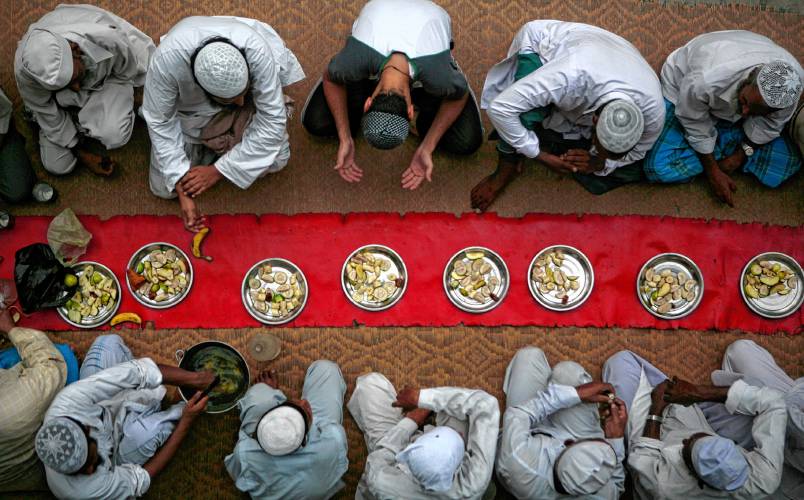
Plates with fruits are laid as fasting Muslims pray before breaking their fast on the first day of Ramadan in the compound of Jamia (Grand) Mosque in Amritsar, India, Sunday, Aug. 23, 2009. Altaf Qadri / AP
| Published: 03-16-2024 6:00 AM |
Robert Azzi is a photographer and writer who lives in Exeter. His columns are archived at robertazzitheother.substack.com.
Dark. Slightly after 5. Still air, warm. As I awaken I hear, above the murmur of heat surging through radiators and random street noises, faint familiar sounds, echoes, that resonate across the cosmos as the Muslim faithful are beckoned to prayer: “God is Great, God is Great ... Prayer is better than sleep.”
Today is the first week of Ramadan fasting, and I’m awake before Fajr, before dawn, to prepare and eat a small meal, perform my ablutions and say my prayers.
Imsak. Start the fast.
Fasting during Ramadan is one of the five obligatory pillars of Islam, a month when all willing Muslims, if they are healthy and beyond puberty, daily abstain from drinking, eating, smoking and sex between dawn and sunset.
First light. Fast.
“O men! Behold, We have created you all out of a male and a female, and have made you into nations and tribes, so that you might come to know one another. Verily, the noblest of you in the sight of God is the one who is most deeply conscious of Him. Behold, God is all-knowing, all-aware.” Qur’an:49:13, Asad
Permit me, please, to share some personal Ramadan reflections with you. While, politically speaking, it’s often challenging to be Muslim in America, I wouldn’t be anywhere else. The United States is generally one of the easiest countries to live in as a Muslim, a land where Muslims can freely lead Sharia-compliant lives, a land where no one tells us whether, how, or when to pray.
Article continues after...
Yesterday's Most Read Articles
 With Concord down to one movie theater, is there a future to cinema-going?
With Concord down to one movie theater, is there a future to cinema-going?
 “It’s beautiful” – Eight people experiencing homelessness to move into Pleasant Street apartments
“It’s beautiful” – Eight people experiencing homelessness to move into Pleasant Street apartments
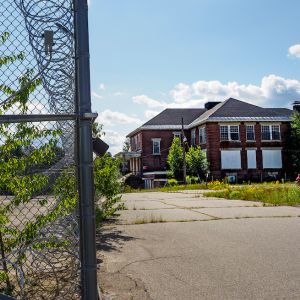 No deal. Laconia buyer misses deadline, state is out $21.5 million.
No deal. Laconia buyer misses deadline, state is out $21.5 million.
 Quickly extinguished fire leaves Concord man in critical condition
Quickly extinguished fire leaves Concord man in critical condition
 Concord police ask for help in identifying person of interest in incidents of cars being keyed during Republican Party event
Concord police ask for help in identifying person of interest in incidents of cars being keyed during Republican Party event
 Update: Victim identified in Lantern Lane fire in Concord
Update: Victim identified in Lantern Lane fire in Concord
Where no authority enforces the fast, where no one tells a woman to be covered and submissive.
Where no one intercedes between me and God.
That doesn’t mean it’s easy: In America’s fractured 24/7, Tweeting, X-ing, TikTok-ing, consumerist society breaks from materialism are difficult, and the journey back to reconnect with the center of our being — our Fitra, our innate nature — can be challenging, especially during times of conflict.
This year, as they fast, many of the thoughts and prayers of the Umma, the global community of Muslims, will be in solidarity with the people of Palestine, especially with those in Gaza, where food is so scarce people are actually dying of starvation.
Thoughts and prayers in solidarity with the people of Gaza, a land where fasting today isn’t an option; it’s obligatory, forced upon its inhabitants — after five months of death, destruction and displacement — by occupiers and oppressors armed with weapons provided by a complicit America.
Provided by my America.
I don’t know yet how that war might affect me this Ramadan, a month I generally look forward to, that I welcome and annually embrace.
“It was the month of Ramadan in which the Qur’an was (first) bestowed from on high as a guidance unto man…” Muslims are informed in Qur’an 2:185; and in God’s first revelation to Prophet Muhammad humankind was instructed: ”Read in the name of thy Sustainer, who has created man out of a germ-cell. Read, for thy Sustainer is the Most Bountiful One who has taught (man) the use of the pen, taught man what he did not know!”Qur’an 96:1-5
Ramadan is the time we are called to return to oneself.
Each day, each year, each Ramadan, I learn more what I do not know, and while I recognize that God lies between the human being and his heart I learn, too, that grace, forgiveness and love from my Beloved is limitless, and welcomes me back whenever I stray.
I don’t know how my anger and witness over what is happening in Gaza, over my anger with my government being complicit with war crimes, might tempt me to stray from my intentions and prayers this Ramadan; I don’t know how I will struggle with turning my anger over to God.
I will fast and pray — and trust in God.
The Islamic hijri calendar is lunar. Each year Ramadan arrives 11 days sooner. In winter, fasting days are short. For example, in June and July fasting from dawn to sunset can last over 17 hours, a challenge during hot New England summers, while this month, March, fasting may be over 13 hours.
Iftar, the daily meal that breaks the fast, begins, in the tradition of Prophet Muhammad, by eating dates. Families and friends gather together, Muslims and non-Muslims, and extra congregational prayers, Tarawih, are performed at night.
Ramadan ends with Eid al-Fitr, Holiday of Fast-Breaking, and is celebrated with community prayer and feasting and, as with Easter and Passover, children receive new clothes and gifts.
Ramadan is a time to fast, pray, reflect and renew. To heal relationships, to try and keep from getting agitated or angry toward others, to re-establish paths to goodness and hospitality.
Ramadan is God’s challenge to mankind: Be mindful of who you are, be mindful of God’s blessings, be compassionate.
Embrace truth.
Daily, our thirst and hunger reminds us not only of the abundance, and sometimes excesses, of our lives but of the many for whom life each day is a struggle with poverty and hunger, of those for whom potable water is an unknown luxury, of those for whom disease and illiteracy is endemic, of those who dwell in dark, desolate corners of our earth.
Reminds us daily of the depredations being visited upon the children of Palestine.
Throughout the world, people are consumed by wars, conflict, poverty and occupation and oppression. Globally, the world is being pillaged for profit, the gifts of the Beloved are daily abused and their beauty forsaken.
I’m in awe of those who sustain their intentions under such circumstances. Indeed, how does one sustain a family? How does a community survive? How does one have strength to embrace Ramadan when each day seems a struggle in darkness?
How do we, who live in such privilege, allow that to continue?
All faiths fast. In our scriptures, in our traditions and stories of the value of fasting, contemplation and renewal, together we find connectedness and paths from darkness to light.
“Is not the fast that I desire, the unlocking of the chains of wickedness, the loosening of exploitation, the freeing of all those oppressed, the breaking of the yoke of servitude? Is it not the sharing of your bread with the hungry, the bringing of the wretched poor into your home, or clothing someone you see who is naked, and not hiding from your kin in their need?” - Isaiah 58:3-7
As people of faith, we put ourselves in the hands of the Beloved.
Our Beloved put me, puts us, and this earth, in each other’s hands and each year Ramadan reminds me I have no dignity unless all have dignity. Ramadan reminds me I deserve no respect until all have respect, that I will be hungry until all are fed.
I will be hungry until Gaza is fed.
Today, within the beauty of Ramadan, in the armor of light that is God’s embrace, I pray for the weak, the sick and the marginalized. I reach to embrace the occupied, oppressed, dispossessed, and exploited.
Ramadan, this gift from God, this challenge to contemplate our commitment to our Beloved, to our brothers and sisters, to all humanity and to this earth, is a blessing for which I am thankful.
Rumi wrote of Ramadan: “Where friends unite together, there in the midst of the house / by God, is a spreading plain.”
Let us gather there, you and I, on that plain, in justice, peace and love.
This is a reconsideration of a previously published Ramadan column, updated to reflect current circumstances.


 Opinion: Summer camp registration: The only thing higher than the price is the anxiety
Opinion: Summer camp registration: The only thing higher than the price is the anxiety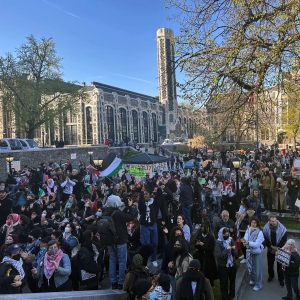 Opinion: ‘This being human is a guest house’
Opinion: ‘This being human is a guest house’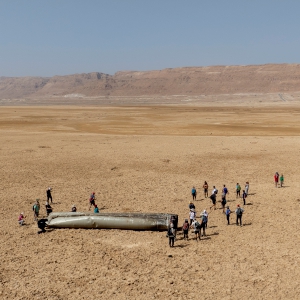 Opinion: The truth of it
Opinion: The truth of it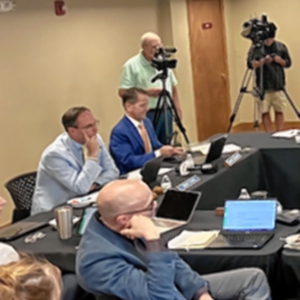 Opinion: Public school standards overhaul will impact every facet of public education in NH
Opinion: Public school standards overhaul will impact every facet of public education in NH
